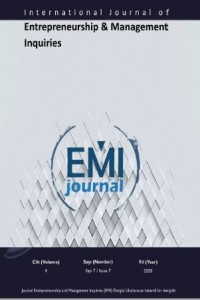Abstract
References
- Acharyya. J. (2009). FDI, growth and the environment: evidence from India on CO2 emission during the last two decades. Journal of Economic Development, 34 (1), 43-58. Türkiye Cumhuriyeti Dış İşleri Bakanlığı. Kyoto Protokolü. Erişim tarihi: 20.10.2020, http://www.mfa.gov.tr/kyoto-protokolu.tr.mfa
- Altun, Y. & İşleyen, Ş. (2019). Türkiye’de iktisadi büyüme ile sanayi sektöründe istihdam arasındaki ilişkinin ARDL Sınır Testi yaklaşımı ile ekonometrik analizi: 1991-2017. Iğdır Sosyal Bilimler Dergisi, 17, 657-666.
- Avazalipour, M. S., Zandi, F., Saberi, R., Hakimipour, N. & Damankeshideh, M., (2013). The impact of FDI on environmental resources in selected countries (Non- OECD). IJRRAS, 17 (1), 111-115.
- Demena, B. A. & Afesorgbor, S. K., (2020). The effect of FDI on environmental emissions: evidence from a meta-analysis. Energy Policy, 138 (111192): 1-17.
- Demir, A. (2009). The effects of global climate change on biodiversity and ecosystem resources. Ankara Üniversitesi Çevrebilimleri Dergisi, 37-54.
- Doğan, S. & Tüzer, M. (2011). Küresel iklim değişikliği ve potansiyel etkileri. Çukurova Üniversitesi İktisadi ve İdari Bilimler Dergisi, 12(1), 21-34.
- Ganoulis, J. (2009). Risk Analysis of Water Pollution. Wiley-VCH, Germany.
- Hitam, M. B. & Borhan, H. B. (2012). FDI, growth and the environment: impact on quality of life in Malaysia. Procedia - Social and Behavioral Sciences, 50(2012), 333-342.
- Jorgenson, A. K. (2006). The transnational organization of production and environmental degradation: a cross-national study of the effects of foreign capital penetration on water pollution intensity, 1980–1995. Social Science Quarterly, 87 (3), 711-730.
- Jorgenson, A. K. (2007). Does foreign ınvestment harm the air we breathe and the water we drink? A cross-national study of carbon dioxide emissions and organic water pollution in less-developed countries, 1975 to 2000. Organization & Environment, 20 (2), 137-156.
- Jorgenson, A. K. (2009). foreign direct ınvestment and the environment, the mitigating ınfluence of ınstitutional and civil society factors, and relationships between ındustrial pollution and human health: a panel study of less-developed countries. Organization & Environment, 22 (2), 135-157.
- Kalami,S., Zandi, F., Avazalipour, M. S., & Farahani, S. M. (2013). The effect of foreign direct ınvestment on water pollution. Journal of American Science, 9 (4s), 54-57.
- Neafie, J. (2018). The role of foreign direct investment (FDI) in promoting access to clean water. POLITIKON: The IAPSS Journal of Political Science, 39 (2018), 7-35.
- OECD. (2016). Water, Growth and Finance: Policy Perspectives. Erişim tarihi: 02.10.2020, https://www.oecd.org/environment/resources/Water-Growth-and-Finance-policy-perspectives.pdf
- Pazienza, P. (2019). The impact of FDI in the OECD manufacturing sector on CO2 emission: evidence and policy issues. Environmental Impact Assessment Review, 77(2019), 60-68.
- Persyn, D. & Westerlund, J. (2008). Error-Correction-Based Cointegration Tests for panel data. Stata Journal, 8(2), 232-241.
- Pesaran, H, M. (2007). A Simple Panel Unit Root Test in the presence of cross-section dependence. Journal of Applied Econometrics, 22 (2), 265-312.
- Rafindadia, A. A., Muyeb, I. M. & Kaita. R. A. (2018). The effects of FDI and energy consumption on environmental pollution in predominantly resource-based economies of the GCC. Sustainable Energy Technologies and Assessments, 25 (2018), 126-137.
- Şener, D. K. & Ocakçı, A. F., (2014). Yoksulluğun çocuk sağlığı üzerine çok boyutlu etkileri. Ankara Sağlık Hizmetleri Dergisi, 13 (1), 57-68.
- Tatoğlu, F. Y. (2016). Panel veri ekonometrisi. İstanbul: Beta Yayıncılık.
- Tatoğlu, F. Y. (2018). Panel zaman serileri analizi. İstanbul: Beta Yayıncılık.
- Türkeş, M. (2008). Küresel iklim değişikliği nedir? Temel kavramlar, nedenleri, gözlenen ve öngörülen değişiklikler. İklim Değişikliği ve Çevre, 1, 26-37.
- Tessendorff, H. (1992). Dublin statement on water and sustainable development: aqua. AQUAAA, 41(3), 129-135.
- UN. (2010). Climate Change Adaptation: The Pivotal Role of Water. Erişim tarihi: 13.10.2020, file:///C:/Users/Owner/Downloads/unw_ccpol_web.pdf
- UNICEF. (2017). Thirsting for a Future: Water and Children in a Changing Climate. Erişim tarihi: 01.10.2020, https://www.unicef.org/publications/files/UNICEF_Thirsting_for_a_Future_REPORT.pdf
- Westerlund, J. (2007). Testing for error correction in panel data. Oxford Bulletin Of Economics and Statistics, 69 (6), 709-747.
GÜVENİLİR SU KAYNAKLARINA ERİŞİMDE DOĞRUDAN YABANCI YATIRIMLARIN VE EKONOMİK BÜYÜMENİN ETKİLERİNİN ANALİZİ
Abstract
İklim değişikliklerine bağlı olarak yaşanan pek çok unsur, insanlığı oldukça olumsuz etkilemektedir. Yeryüzündeki su kaynakları da gerek iklim değişikliğinin yol açtığı etkenler, gerekse sanayileşmenin olumsuz etkileri kapsamında ciddi anlamda tehdit altındadır. Hali hazırda su kıtlığı çeken bölgelerde yaşayan insan sayısı 1 milyarın üzerindedir. Dünyamızı, çatışmalara, yoksulluğa ve iklim değişikliklerinin olası olumsuz etkilerine karşı korumaya yönelik olarak Ocak 2016’da yürürlüğe giren sürdürülebilir kalkınma kriterlerinden altıncısı; temiz su ve sanitasyon başlığı altında ülke nüfuslarının yüzdesel olarak ne kadarının güvenilir suya erişiminin olduğu raporlanmaktadır. Çalışmanın amacı ise temelde yabancı yatırımların güvenilir suya erişim olanaklarını artırıp artırmadığını test etmekle birlikte, temiz suya erişim üzerinde etkisi olabileceği düşünülen kişi başına milli gelir ile arasındaki eşbütünleşme ilişkisinin de varlığının sınanmasıdır. Bu amaçla 2000-2017 yılları için, Westerlund Eşbütünleşme Testi ve Heterojen PDOLS- Panel Dinamik En Küçük Kareler tahmincisi kullanılarak; dünya sıralamasında en fazla güvenilir su erişim yüzdesine sahip ilk 20 ve en düşük yüzdeye sahip son 20 ülke olmak üzere toplam 40 ülke için analiz gerçekleştirilmiştir. Analiz sonucunda, kişi başına milli gelir ve doğrudan yabancı yatırımların temiz suya erişim üzerinde uzun süreli ve istatistiki olarak anlamlı pozitif etkilerinin varlığı tespit edilmiştir.
References
- Acharyya. J. (2009). FDI, growth and the environment: evidence from India on CO2 emission during the last two decades. Journal of Economic Development, 34 (1), 43-58. Türkiye Cumhuriyeti Dış İşleri Bakanlığı. Kyoto Protokolü. Erişim tarihi: 20.10.2020, http://www.mfa.gov.tr/kyoto-protokolu.tr.mfa
- Altun, Y. & İşleyen, Ş. (2019). Türkiye’de iktisadi büyüme ile sanayi sektöründe istihdam arasındaki ilişkinin ARDL Sınır Testi yaklaşımı ile ekonometrik analizi: 1991-2017. Iğdır Sosyal Bilimler Dergisi, 17, 657-666.
- Avazalipour, M. S., Zandi, F., Saberi, R., Hakimipour, N. & Damankeshideh, M., (2013). The impact of FDI on environmental resources in selected countries (Non- OECD). IJRRAS, 17 (1), 111-115.
- Demena, B. A. & Afesorgbor, S. K., (2020). The effect of FDI on environmental emissions: evidence from a meta-analysis. Energy Policy, 138 (111192): 1-17.
- Demir, A. (2009). The effects of global climate change on biodiversity and ecosystem resources. Ankara Üniversitesi Çevrebilimleri Dergisi, 37-54.
- Doğan, S. & Tüzer, M. (2011). Küresel iklim değişikliği ve potansiyel etkileri. Çukurova Üniversitesi İktisadi ve İdari Bilimler Dergisi, 12(1), 21-34.
- Ganoulis, J. (2009). Risk Analysis of Water Pollution. Wiley-VCH, Germany.
- Hitam, M. B. & Borhan, H. B. (2012). FDI, growth and the environment: impact on quality of life in Malaysia. Procedia - Social and Behavioral Sciences, 50(2012), 333-342.
- Jorgenson, A. K. (2006). The transnational organization of production and environmental degradation: a cross-national study of the effects of foreign capital penetration on water pollution intensity, 1980–1995. Social Science Quarterly, 87 (3), 711-730.
- Jorgenson, A. K. (2007). Does foreign ınvestment harm the air we breathe and the water we drink? A cross-national study of carbon dioxide emissions and organic water pollution in less-developed countries, 1975 to 2000. Organization & Environment, 20 (2), 137-156.
- Jorgenson, A. K. (2009). foreign direct ınvestment and the environment, the mitigating ınfluence of ınstitutional and civil society factors, and relationships between ındustrial pollution and human health: a panel study of less-developed countries. Organization & Environment, 22 (2), 135-157.
- Kalami,S., Zandi, F., Avazalipour, M. S., & Farahani, S. M. (2013). The effect of foreign direct ınvestment on water pollution. Journal of American Science, 9 (4s), 54-57.
- Neafie, J. (2018). The role of foreign direct investment (FDI) in promoting access to clean water. POLITIKON: The IAPSS Journal of Political Science, 39 (2018), 7-35.
- OECD. (2016). Water, Growth and Finance: Policy Perspectives. Erişim tarihi: 02.10.2020, https://www.oecd.org/environment/resources/Water-Growth-and-Finance-policy-perspectives.pdf
- Pazienza, P. (2019). The impact of FDI in the OECD manufacturing sector on CO2 emission: evidence and policy issues. Environmental Impact Assessment Review, 77(2019), 60-68.
- Persyn, D. & Westerlund, J. (2008). Error-Correction-Based Cointegration Tests for panel data. Stata Journal, 8(2), 232-241.
- Pesaran, H, M. (2007). A Simple Panel Unit Root Test in the presence of cross-section dependence. Journal of Applied Econometrics, 22 (2), 265-312.
- Rafindadia, A. A., Muyeb, I. M. & Kaita. R. A. (2018). The effects of FDI and energy consumption on environmental pollution in predominantly resource-based economies of the GCC. Sustainable Energy Technologies and Assessments, 25 (2018), 126-137.
- Şener, D. K. & Ocakçı, A. F., (2014). Yoksulluğun çocuk sağlığı üzerine çok boyutlu etkileri. Ankara Sağlık Hizmetleri Dergisi, 13 (1), 57-68.
- Tatoğlu, F. Y. (2016). Panel veri ekonometrisi. İstanbul: Beta Yayıncılık.
- Tatoğlu, F. Y. (2018). Panel zaman serileri analizi. İstanbul: Beta Yayıncılık.
- Türkeş, M. (2008). Küresel iklim değişikliği nedir? Temel kavramlar, nedenleri, gözlenen ve öngörülen değişiklikler. İklim Değişikliği ve Çevre, 1, 26-37.
- Tessendorff, H. (1992). Dublin statement on water and sustainable development: aqua. AQUAAA, 41(3), 129-135.
- UN. (2010). Climate Change Adaptation: The Pivotal Role of Water. Erişim tarihi: 13.10.2020, file:///C:/Users/Owner/Downloads/unw_ccpol_web.pdf
- UNICEF. (2017). Thirsting for a Future: Water and Children in a Changing Climate. Erişim tarihi: 01.10.2020, https://www.unicef.org/publications/files/UNICEF_Thirsting_for_a_Future_REPORT.pdf
- Westerlund, J. (2007). Testing for error correction in panel data. Oxford Bulletin Of Economics and Statistics, 69 (6), 709-747.
Details
| Primary Language | English |
|---|---|
| Subjects | Economics |
| Journal Section | Articles |
| Authors | |
| Publication Date | December 31, 2020 |
| Submission Date | November 13, 2020 |
| Acceptance Date | December 7, 2020 |
| Published in Issue | Year 2020 Volume: 4 Issue: 7 |



Journal EMI e-mail Adresi: internationaljournalemi@gmail.com
JOURNAL EMI Creative Commons Attribution 4.0 Uluslararası Lisansı ile lisanslanmıştır.


